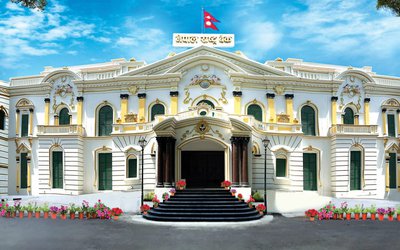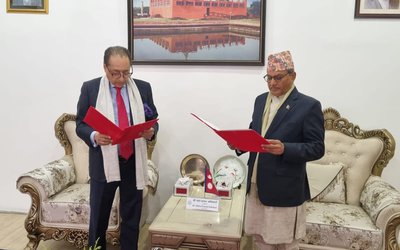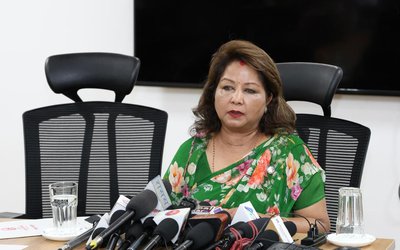
Having spent almost three decades in the social welfare sector, KAMALA THAPA, who spent fifteen years between 1994 and 2011 as the country director of Marie Stopes International Nepal, is now the Chairperson of Sunaulo Parivar Nepal (SPN). Thapa has played an important role to establish the right to reproductive health, particularly the right to abortion in Nepal. Thapa, wife of former Chief of Army Staff General Pyar Jung Thapa, spoke to NEW SPOTLIGHT on various issues. Excerpts:
Since Nepal has made a major progress in achieving the target on Maternal Mortality Rate (MMR) in the last few decades, what does the country need to do to sustain the achievement?
I am very happy to see the progress made by Nepal in MMR. As a person involved in this sector for over three decades, it is a matter of satisfaction to save the life of pregnant women. Maternal Mortality requires a focus on three things. They include family planning, safe and legal abortion and medical care during delivery. This is where SNP has been focusing. Most of this expansion and delivery of critical MSI services occurred during the Maoist insurgency. I am extremely proud to have played an important role with my MSI team in delivering MSI services to my country’s women.
What was it like in the past?
It was very difficult to raise the issue of abortion in early days. It was more difficult to find trained health manpower in rural and remote parts of Nepal. However, I achieved the target, recruiting the local staff and training them. When I was the country director of Marie Stopes, there were 700 full time employees throughout the country and 63 clinics across the country. I supported the development of the country by providing training to local people, that is, human resources development in health sector.
What is the state of the clinics now?
After my resignation, the new country director reduced the number of offices because of lack of resources and other problems. However, I am happy that the laid-out workers of Marie Stopes International Nepal are running good clinics to perform legal abortion. This is the result of the training provided during my tenure. As they are fully trained and experienced, qualified and fully motivated and inspired, they are running the clinics providing high quality services. I do receive phone calls from them. They say they are sustaining the clinics by mobilizing the local resources. There are over 20 clinics.
Despite the reduction in the MMR drastically in the last decade, there is a likelihood of a rise in MMR again. How do you sustain the progress in the context of Social Development Goals (SDGs)?
I am happy that Nepal’s new constitution has endorsed Reproductive Right as a fundamental right. This will give women the right to decide on their own body and child. This is recognized by the state. However, Nepal is yet to take a lot of steps to improve the right to equality. You can see a lot of hangover of the patriarchal society. Women are still backward and society is yet to give recognition to the contribution made by women in family, society and country. There is a high saving of women now even as they are fulfilling every responsibility.
What would be the target for the next ten years?
Although the women are given 33 percent reservation in all sectors, many capable and dynamic women do not get the opportunity. Women can still do a lot of work.
How easy is it for women to go for safe abortion?
Following the legalization of safe abortion, the government has been providing the service though the government hospitals and other facilities. This is a good thing.
How do you look at the recent reward for your work?
The reward recently given by Ministry of Health and Population recognized my contribution. My work also helps to improve the health of the poor people. Even during my tenure as the head of Nepal Army’s Spouse Association, I had made a great contribution by providing training to over 1,000 women.
When you were the country director of Marie Stopes, abortion was illegal in the country and MMR was at its highest. How do you see the present scenario when Nepal is recognized among the few countries that achieved the MDG target in MMR?
When I joined Maries Stopes as the country director in 1994, abortion was illegal and MMR was the highest, that is, over 600 in 10,000. One of the reasons behind the death was premature pregnancy and unsafe abortion. My aim was to provide services to the low income people who did not have the capacity to pay a high price for illegal abortion. Majority of our populations are low income group and my aim is also to save them. I have registered a Sunaulo Parivar Nepal, a local NGO in Nepal, to provide services to the people. I have convinced them that there is the need to lobby for safe abortion. Some gynecologists were minting money in unsafe abortion. However, the poor Nepalese women were dying without getting such facilities. I focused my life to protect the rights of Nepalese women.
How did the government recognize your work?
After a long time, Nepal government has recognized SNP and my contribution in reducing Maternal Mortality. I feel proud of it. SNP has been working with a mission, children by choice, not by chance. It is now supporting the programs to prevent unwanted births. Our clinics also ensure that every birth is wanted amongst all segments of population including poor, marginalized and rural communities.
What is your target then?
We believe women, regardless of where they live, should have access to comprehensive sexual and reproductive health services – including a range of contraceptive methods and, where legal, access to safe abortion – so they can make informed choices about their reproductive health. Where the law allows, we offer women a choice of both surgical and medical abortion. In these settings, we work to empower women to make their own decisions and give training to existing healthcare providers on how to counsel women through this process, and on how to provide post-abortion care.
What is the vision of SNP?
Our vision is a world in which every birth is wanted. Our work on HIV and other sexually transmitted infections is fully integrated into our broader sexual and reproductive health programs. Poor sexual and reproductive health and HIV infection have common roots in poverty, gender inequality, stigma and cultural factors.
What does SNP provide?
SNP provides high-quality post-abortion care for women suffering from the consequences of an unsafe abortion or a spontaneous miscarriage -- which is critically important in any setting. Our providers are trained to provide emergency treatment for the injuries caused by these events, along with proving family planning counseling and services to reduce the chances of another unintended pregnancy. Our target is to educate and empower women so that every child she has is by choice, not chance. No woman should have her life or health at unnecessary risk and we are here to support women to access safe choices.
- ADB’S CHIEF ECONOMIST: Nepal Reduces Poverty
- Mar 11, 2025
- FM DR. DEUBA: A Successful Visit
- Mar 11, 2025
- MD GHISING: Target Of Personal Grudge
- Mar 09, 2025
- UPPER TRISHULI-1 HYDROPOWER: Supporting Community Development
- Feb 24, 2025
- ADB POWERING NEPAL: Five Decades Of Support
- Feb 24, 2025















